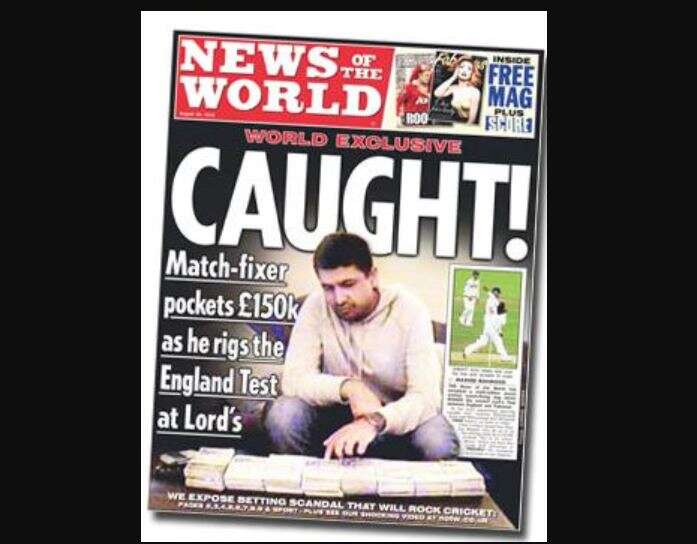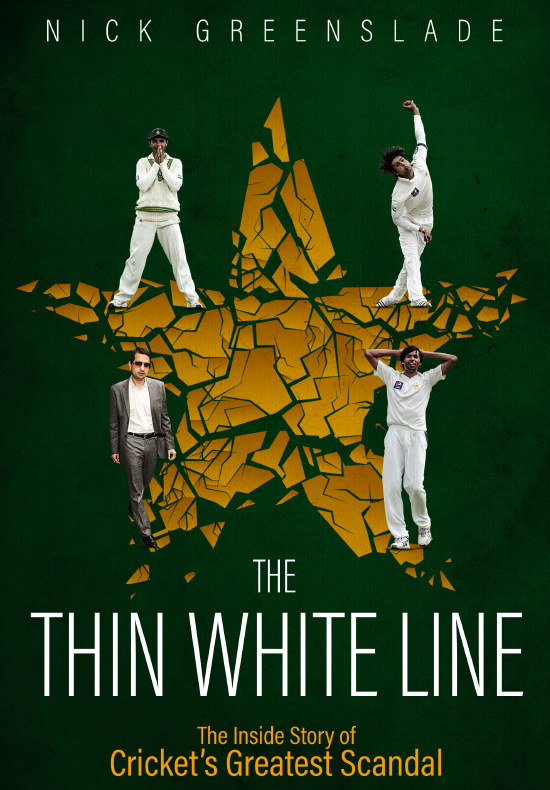
 The News of the World has become synonymous with journalistic malpractice after its ignominious closure nine years ago. But this weekend marks ten years since one of its greatest scoops, obtained by the paper’s ‘Fake Sheikh’ Mazher Mahmood (who was himself jailed in 2016 ). Here Nick Greenslade (author of The Thin White Line – The Inside Story of Cricket’s Greatest Scandal) looks back on the affair
The News of the World has become synonymous with journalistic malpractice after its ignominious closure nine years ago. But this weekend marks ten years since one of its greatest scoops, obtained by the paper’s ‘Fake Sheikh’ Mazher Mahmood (who was himself jailed in 2016 ). Here Nick Greenslade (author of The Thin White Line – The Inside Story of Cricket’s Greatest Scandal) looks back on the affair
On the evening of Saturday, 28 August 2010, I sat on the sports desk of The Sunday Times eagerly waiting for the first editions of the News of the World to arrive on the editorial floor.
Word had got around that the ‘Screws’ had something big in the offing because The Sunday Times shared a parent company, News International, offices and printers with the tabloid.
When it arrived around 10pm, the News of the World did not disappoint. The front page said it all: CAUGHT! Match-fixer pockets £150k as he rigs the England Test at Lord’s.
When play in the Test resumed on Sunday morning, the fourth day of the fourth and final Test between England and Pakistan, the story was dominating news as well as sports bulletins. Even MCC members – who might have thought twice about using it to line their cat litter – could be seen reading the paper.
This was one newspaper edition, then, which would not be condemned to a second life as tomorrow’s fish and chip paper.
It was all there in black and white – the captain, Salman Butt, and his two best bowlers named and shamed – and in glorious technicolour – the photo of Mohammad Amir and Mohammad Asif bowling no-balls to order.
Within six months all three had been banned from cricket for a minimum of five years. Within 16 months, all three, plus their agent Mazhar Majeed who acted as the conduit with Asian betting syndicates, had been found guilty at Southwark Crown Court and were each contemplating time behind bars.
Ten years on, the ‘spot-fixing’ scandal remains a landmark moment in cricket but also in journalism. This wasn’t some inconsequential county match where one or two bad apples whom no one had ever heard of were on the fiddle. This was an actual Test match at Lord’s, the home of cricket, where the Pakistan captain and his agent had co-opted the team’s two best bowlers into a fix.
Unbeknown to the four, they were themselves having their strings pulled by Mazher Mahmood, the News of the World’s chief investigative reporter, also known as the ‘Fake Sheikh’.
Earlier that summer, Mahmood had received from a source a cache of messages to and from Majeed’s Blackberry which presented compelling evidence he was trying to fix matches. Posing as an Indian businessman eager to entice Majeed’s players to play in a new T20 tournament in the Middle East, Mahmood reeled him in through a series of meetings in upmarket London hotels and restaurants.
The (literal) money shot in this tabloid sting came on 25 August, the night before the Lord’s Test, when Majeed was caught on camera accepting £140,000 cash in exchange for arranging Amir and Asif to bowl no-balls at pre-determined moments in the match. Butt was essential to the plan too because as captain he decided who bowled and when.
Mahmood and his News of the World colleagues had worked on many similar operations but never one as big as this and which had gone exactly according to the playbook.
As Tom Crone, the paper’s lawyer, told the then editor Colin Myler in one of their pre-publication conferences: “In my 26 years working here, I think this is the best investigative story I’ve ever seen. Something is going to happen in the middle of a Test match and we can report that we already knew it was going to happen.”
I spoke to all those journalists who worked on the story and several aspects became immediately apparent. For all their hunger to expose criminality, I don’t think it ever occurred to them that the cricketers they were accusing would eventually end up in prison. That said, if it hadn’t been for the country’s highest-selling newspaper kicking up an almighty stink, one of the police officers revealed, the Met and CPS might not have seen the case all the way through to trial.
Another point which struck me was Mahmood’s tenacity to get the story over the line. This is where things get complicated because he was and remains a divisive figure in journalism, just as the paper itself was.
The milieu in which he and fellow hacks operated meant that they were often mirror images of the rogues they were exposing: quick-witted, resourceful and – let’s not deny it – downright devious at times. Morals, like expenses claims, were made up as you went along.
Yet the spot-fixing episode was never tainted by the phone-hacking scandal that led to the title’s demise. Nor has it been undermined by the criminal conviction which ended the career of Mahmood – sentenced to a year’s imprisonment in 2016 for perverting the course of justice while giving evidence against the pop star Tulisa in a drugs trial prompted by another of his exposés.
I wanted to tell this tale not simply because it is a good one – as much a ‘true crime’ story as a cricket one – but because of the way the News of the World left this world.
The phone-hacking claims cannot be overlooked and its ‘chequebook journalism’ wasn’t to everyone’s liking but it also did some important reporting. This has largely been overlooked in the years since.
Much of this related to crime and much of it was overseen by Mahmood. The Pakistan spot-fixing expose was the jewel in this particular crown. The term, ‘world exclusive’, is often loosely appended by newspapers to front-page splashes but this was one which genuinely merited that status. It was the fix heard around the world.
Nor are there many outfits left in our industry that have the News of the World’s ambition, scope and budget. Try getting the managing editor to sign off £150,000 (there had been an earlier £10k payment to Majeed to win his trust) in cash now with no guarantee of getting the money back.
Their investigation prompted other newspapers and broadcasters to start poking around the darker recesses of sport. Many of these exposed genuine corruption and wrongdoing but none has ever come close to attaining the impact of what the paper exposed a decade ago. It remains the gold standard.
The Thin White Line: The inside story of cricket’s greatest fixing scandal (Pitch Publishing) by Nick Greenslade is available to buy now. Greenslade is deputy sports editor of The Sunday Times.

Email pged@pressgazette.co.uk to point out mistakes, provide story tips or send in a letter for publication on our "Letters Page" blog
